Center for Young Children (CYC)
Academic Programs and Camp
The CYC operates a :
- Full day preschool program for children ages 3 through 5, Monday through Friday, September to June.
- Kindergarten, State certified program September through June
- Summer Camp- a six-week program during late June- early August
At the Center for Young Children, highly qualified, degreed teachers work with children using the Project Approach to support their development within seven learning areas: personal and social Development, language and literacy, mathematical thinking, scientific thinking, social studies, the arts, and physical development.
The Curriculum
The CYC's curriculum is based on research on how children learn and develop, teacher knowledge of children's individual skills and abilities, family knowledge of children's cultural and linguistic contexts, and what is meaningful for each child. Curriculum emerges as a collaborative process between teacher guidance and children's interests.
Some of the intellectual goals of the curriculum are:
- To encourage children to be actively involved in the learning process.
- To prompt children to think critically and creatively.
- To aid children in asking questions and discovering answers.
- To encourage children to become curious and enthusiastic learners.
- To support children in experiencing success and developing self-confidence.
- To promote, model, and support appropriate social behavior.
Each learning area is considered as teachers set up appropriate materials for exploration and scaffolding of knowledge, as well as in the choice of study topics that allow for first-hand experiences. The Center for Young Children's Study Approach is based in theory on the educational philosophy of John Dewey and the Project Approach, a set of teaching strategies that enable teachers to guide children through in-depth studies of real world topics. Each study topic is explored for several weeks, giving the children opportunities to ask questions, actively explore hands-on materials, interview experts, reflect on information gained, and share new knowledge with peers.
However, projects are not the entirety of the curriculum. Children also participate in non-project related learning centers and activities that encompass the full range of Maryland's Early Learning Standards for preschool and College and Career Ready Standards for kindergarten.
Curriculum Related Links
- Center for Young Children Curriculum Statement PDF
- Project Approach Website
- A Quilting Study
- A Restaurant Study
- A Mixing Study An example of a project implemented during summer camp.
- A Summer Camp Energy Study
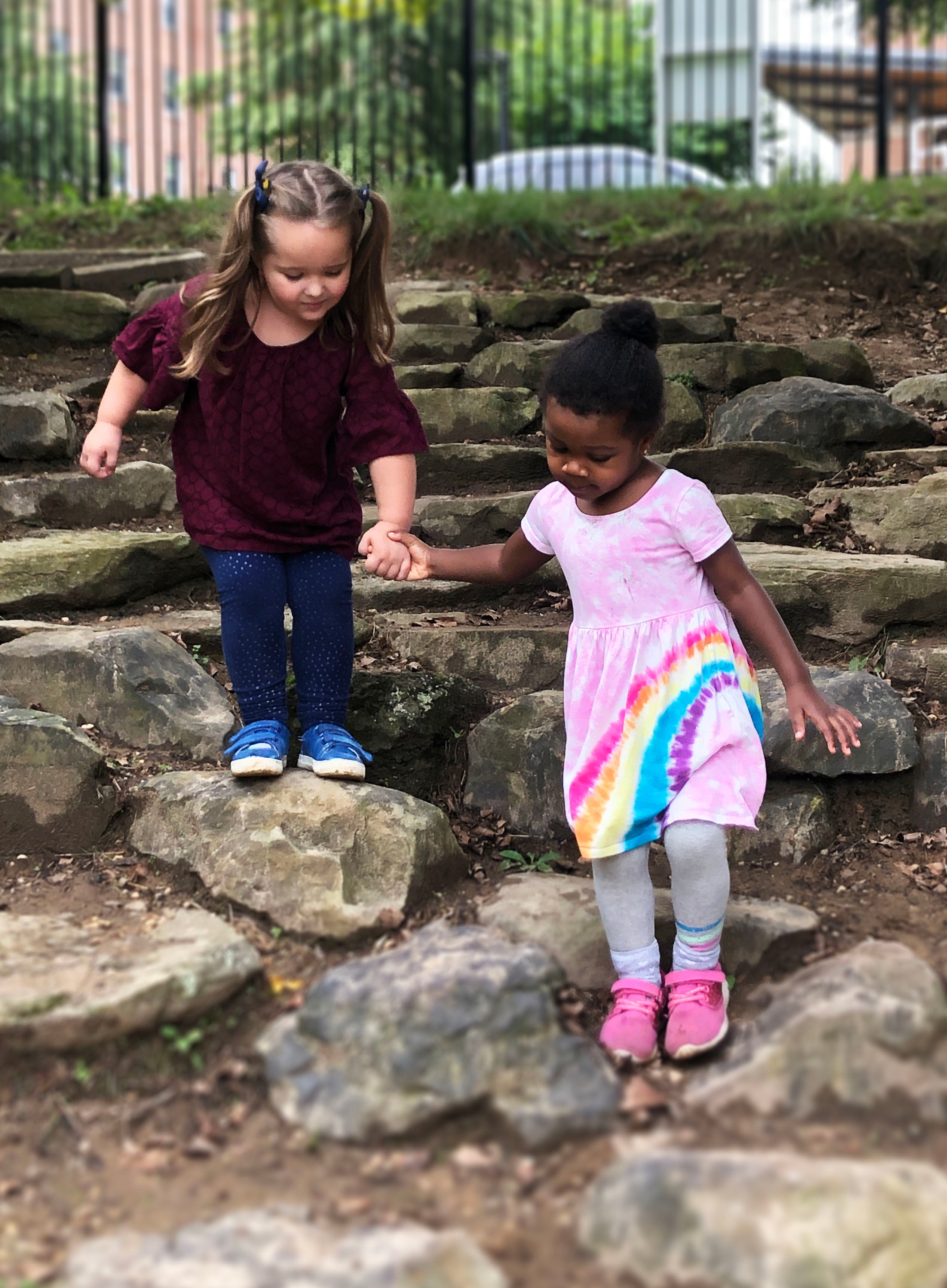
Preschool classrooms at the CYC include children ranging from three to five years of age. Research shows that multi-age groupings benefit both younger and older students in the classroom. According to Dr. Lilian Katz, an international leader in early childhood education, "Mixed-age grouping resembles family and neighborhood groupings, which throughout history have informally provided much of children's socialization and education" (from The Case for Mixed-Age Groupings in Early Education, 1990).
Children's personal and social development is enhanced through the building of relationships within the classroom community. Teachers and children interact through conversation, free-choice of activities, and daily class meetings in which children participate in the progression of the class study. Children are encouraged to explore and discover within their immediate world, and teachers act as recorders of their ideas and experiences. Children are expected to learn to follow classroom rules and routines, and are given the needed assistance in developing positive conflict resolution skills.
When children walk into a classroom at the CYC, they are surrounded by a language-rich environment. Book areas are integral to every classroom, where children are able to spend quiet time looking at books on their own or within a group. Books are integrated into all areas of the curriculum, with non-fiction picture books available at the science table or books about shapes displayed at the math center. Through exposure to different types of children's literature, teachers encourage a deep appreciation of reading. Children see teachers writing down their ideas in the classroom and are thus exposed to language and literature in a meaningful way. Teachers become aware of each child's individual development, and provide appropriate materials and experiences to support each child's growth.
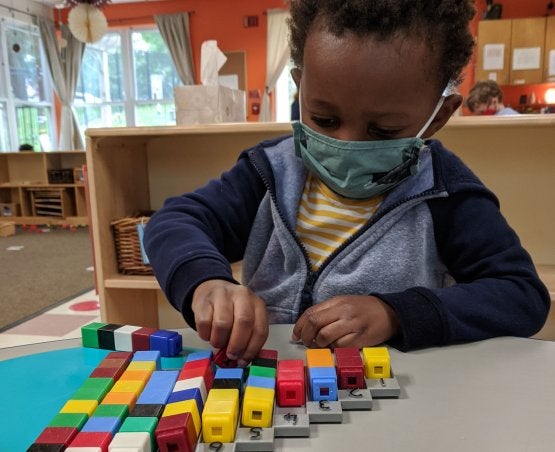
To encourage mathematical thinking, preschool children are given the opportunity to explore and experience. Inviting materials are available for counting, sorting, measuring, patterning, and seriating. Teachers model appropriate ways for using materials and children are given choices of what to use. Children can set up a table with sorting trays and a basket of small, plastic farm animals. They then have the opportunity to look at the materials and choose criteria by which to sort them. Each classroom has an extensive block area in which children can build using Unit Blocks and explore aspects of size, proportion, and position.
Building skills through experience also applies to scientific thinking. Given magnifying glasses, children can explore their class gardens, the class pet, or a leaf collected on the playground. Many study topics provide scientific experiences for observations, such as "gardening" or "insects." Teachers assist the children by asking scaffolding questions and encouraging them to become scientific thinkers who ask questions and research answers.
Each CYC classroom features a dramatic play area that allows children to explore the world through imaginative play. From clothes to dress up in and props that encourage play, to large hollow blocks to create structures to interact in, children use the dramatic play area to try to better understand the world around them. Teachers observe play and encourage children to represent their experiences through play. For example, following a field trip to a veterinarian's office, children may wish to create their own version within this area. Teachers help children decide on props and rules to allow for this representation. Opportunities such as these help to build children's social studies learning.
Art experiences include drawing, easel painting, collage and clay. Daily exposure to these materials allows children to continue to build their skills throughout their years at the CYC. Children are given the opportunity to express themselves freely through these media and are encouraged to share their work with others. Throughout the week, classes participate in group music and movement activities, such as fingerplays, singing, or creative movement activities based on familiar stories.
Children develop physical skills through movement and activity. Morning and afternoon playground time is part of the daily schedule to allow for gross motor activity. Our playground offers the opportunity to run, climb, slide, ride tricycles and scooters, and play ball. In the classroom, children develop fine motor skills by working with art and writing tools, puzzles, and computers. Various manipulative materials are available for children to explore while developing their fine motor skills.
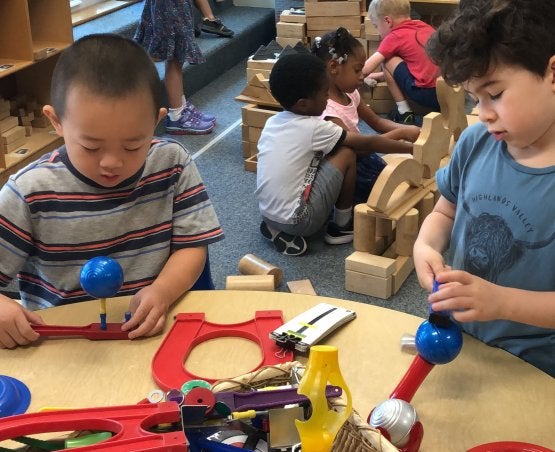
The CYC Kindergarten, as in the preschool classrooms, follows the constructivist approach to learning exemplified by open-ended learning centers based on the knowledge that children learn best by working with materials in a purposeful, playful, hands-on way. Centers include the science table, art table, math table, block area, meeting area, and dramatic play. Materials available in each center allow children to work in multiple ways depending on their development. This provides opportunities for children to strengthen their current understandings as they apply them to their play as well as explore new concepts. For example, children may sort materials at the math table based on color in a preschool classroom and then begin to sort by multiple attributes such as color, shape, and size, in kindergarten.
As children work with materials they construct their own understandings through self-guided exploration, learn from peer interaction, and further their thinking and use of academic language through teacher questioning and modeling. Writing utensils and texts (e.g.. books, menus, magazines, etc.) are integrated throughout the classroom to foster their use in authentic ways.
In addition to child-initiated activities throughout the day, children participate in whole group meetings, small group activities and individualized instruction to further support their literacy, mathematical, and scientific development. In kindergarten children continue to study real-world topics through the Project Approach (Lillian Katz, Sylvia Chard, & Judy Harris Helm), however the projects become more in-depth as they are familiar with these types of investigations, develop more complex thought processes, and can sustain attention to a topic for a longer period of time. Kindergartners are active participants and decision makers through the investigation, voting on topic ideas, helping to determine how to study their chosen topic, and choosing how to culminate their study and share what they have learned with the CYC community. Previous kindergarten studies include The Human Body, Musical Instruments, Airplanes, Boats, and Electricity.
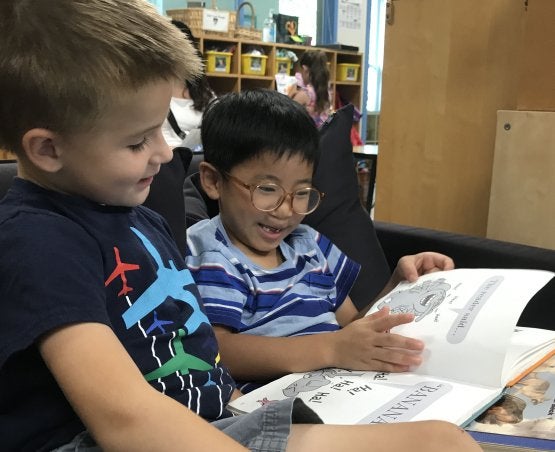
The kindergarten classroom aims to foster confident, motivated, capable readers and writers who understand and value the use of reading and writing. Children are engaged in whole group reading or writing instruction each day during a Reader’s or Writer’s Workshop meeting in which specific concepts are taught and reviewed, as outlined by Lucy Calkins. This meeting is followed by individual and small group participation in reading games or writing activities.
Teachers guide children’s individual writing development through stages beginning with pretend writing and moving toward writing sentences and stories. The combination of invented spellings (sounding out of words) and conventional spellings are supported by encouraging children to sound out unknown words and use resources around the room, such as our Word Wall, to write frequently used words. Games and individual teacher interactions provide authentic meaningful contexts to support children’s growing letter/sound correspondence, concepts of print, memorization of sight words, use of letter blends, and other important skills needed for reading and writing. Additionally, chapter books are read before rest time throughout the year and children are encouraged to critically think about and analyze texts read aloud.
During the spring semester of kindergarten children work with teachers in small groups on Sentence Journals and one-on-one with guided reading in addition to Reader’s and Writer’s Workshop. Small group instruction takes place to support and challenge children as needed. All stages of writing and reading development are respected in our classroom and children are given ample opportunities to share their writing with the class and display their work.
Children explore mathematical concepts on a daily basis through self-initiated choices in the block area, at the math table, and using tools around the classroom. Teachers provide mathematical language to enable children to explain their creations and observations. Teacher-created games and activities often entice children to further work with math related concepts in a more direct way. For example, teacher-made board games may require children to add the value on two dice, and beads may be available for making patterned jewelry.
Children are also engaged in math word problems during whole group and small group instruction with the help of concrete materials to solve these problems. Word problems ask children to solve mathematical equations in story form, often based on real life situations, making the problem more meaningful to the children. Once children understand how to solve a word problem, the number sentence is introduced. Throughout the year children are engaged in higher-order thinking while working with materials through teacher questioning that guides them to think in new ways. Children also participate in collecting data through surveys, representing the data in different ways, and analyzing and interpreting the data. During the second semester children meet in small groups to formally explore concepts such as money, weight, estimation, and 3-dimensional shapes in game-like situations.
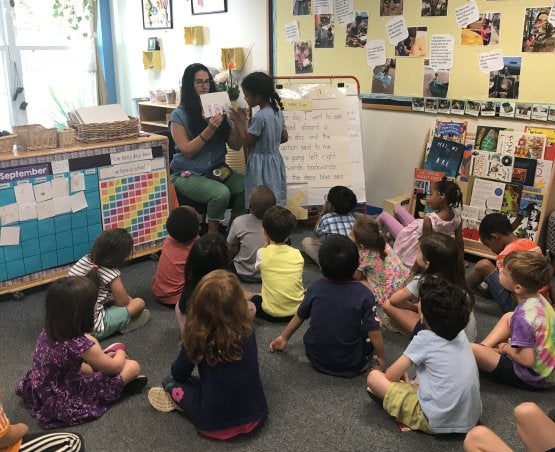
Scientific thinking is encouraged throughout the classroom by the abundance of living things and interesting materials. The kindergarten classroom currently has a guinea pig that children interact with on a regular basis. Children are encouraged to observe the world around them, both in and out of the classroom, form questions, and investigate answers to their questions by creating experiments. Each year children have the opportunity to work with large balls and ramps outside of the classroom exploring concepts such as weight, size, force, speed, and balance. Other materials are brought into the classroom reflecting children’s interests.
Fostering children’s social and emotional development continues to be an emphasis in the kindergarten classroom. We guide children towards independence, modeling problem solving skills and encouraging them to “use their words” to solve problems with their peers before coming to a teacher for help. Children are given responsibilities and are empowered to be positive leaders within the classroom and to the younger children on the playground. Responsibilities such as choosing a place to sit during group meetings supports children’s growing ability to self-regulate their behavior.
The CYC kindergarten supports Vygotsky’s philosophy that teachers are facilitators of learning and children should be taught to initiate and direct their own learning. Children are taught to be cooperative members of a classroom community, to be inquisitive about the world around them, to research answers to their questions, and the important roles of reading, writing, and mathematics in their lives, all of which set them on the path to being lifelong learners.
Camp enrollment is now open to the public!
CYC Summer Camp 2026 will run from June 22 to July 31. We will be closed for Independence Day on Friday, July 3, and will close at 1:00 pm on the last day of camp, July 31.
If you have questions that are not answered on this page about the CYC Summer Camp Program, please email cyc-camp@umd.edu.
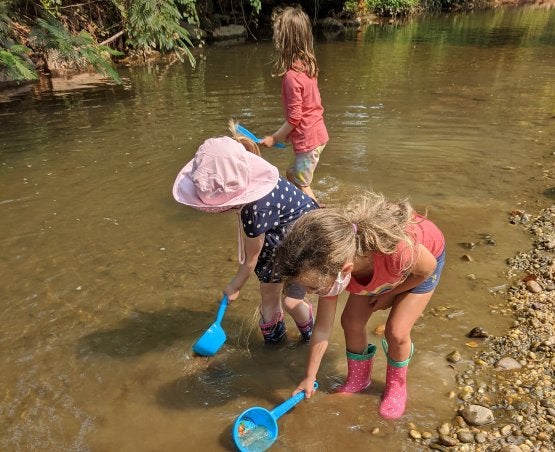
The Center for Young Children, located on the College Park Campus, is a state-of-the-art facility that provides an environment that educates and cares for children in a developmentally appropriate manner. The CYC offers preschool and school age summer programs. Children must be 3 years old before the first day of camp and must be fully potty-trained. The oldest children we enroll are rising First Graders.
The Program
CYC Summer Camp will be under the direction of Amy Laakso and Cici Fowler, who have worked as past Summer Camp teachers and directors for the CYC.
Camp hours are from 8:30 AM to 5:30 PM daily. The program will be based at the CYC building. Teachers will continue to provide exciting, developmentally appropriate activities for the students. Morning and afternoon snacks are provided as well as milk for lunch. Families are responsible for packing a lunch for each child. Each classroom has a rest time as required by state licensing. Campers swim twice per week at the Eppley Recreation Center's outdoor pool, with the help of family chaperones.
Registration Information
RRegistration for summer camp 2026 is now open!
Please complete the Summer Camp Contract and email it to cyc-camp@umd.edu after making your payment below.
Please note: Current CYC families are NOT automatically registered for camp.
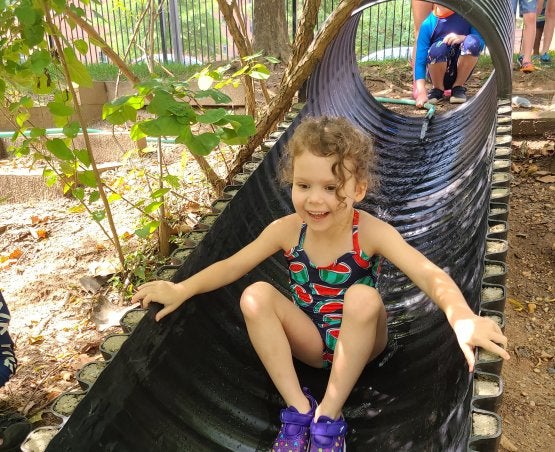
2026 Tuition Information
Tuition is one flat rate for the six weeks and will include a camp t-shirt. The payments are made according to the following schedule. All bill payments are made online. All payments are non-refundable once paid.
Click the links within the chart below to pay each camp payment separately or scroll down to pay in full.
| Payment Schedule and links | 4 Equal Payments | |
|---|---|---|
| Total | $2,750 | |
| 1st Payment | $687.50 | Due with registration |
| 2nd Payment | $687.50 | Due Feb 27 |
| 3rd Payment | $687.50 | Due April 10 |
| 4th Payment | $687.50 | Due May 8 |
Or you can pay all four payments at one time here. NOTE: Camp payments are not refundable.
When any payment is more than one week in arrears, the CYC holds the right to cancel that family's enrollment.
For more information, please call 301-405-3168 or e-mail cyc-camp@umd.edu.